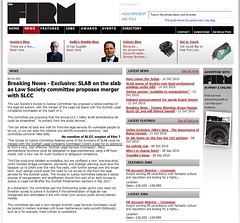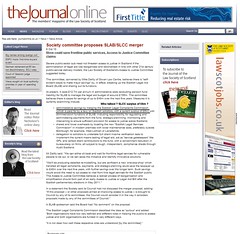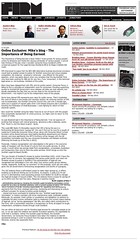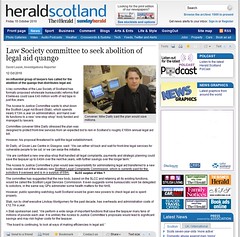 Govan Law Centre’s Mike Dailly suggests Law Society should take over Legal Aid Board & SLCC. A BACKROOM PLOT by the Law Society of Scotland to assume control of the Scottish Legal Aid Board & the Scottish Legal Complaints Commission has somewhat backfired after key financial information alleging the costly law complaints quango is holding a whopping £6 million pound surplus was provided to a newspaper by the Law Society of Scotland's Access to justice committee, headed by Mike Dailly, boss of the Glasgow based Govan Law Centre.
Govan Law Centre’s Mike Dailly suggests Law Society should take over Legal Aid Board & SLCC. A BACKROOM PLOT by the Law Society of Scotland to assume control of the Scottish Legal Aid Board & the Scottish Legal Complaints Commission has somewhat backfired after key financial information alleging the costly law complaints quango is holding a whopping £6 million pound surplus was provided to a newspaper by the Law Society of Scotland's Access to justice committee, headed by Mike Dailly, boss of the Glasgow based Govan Law Centre.
The audacious campaign by the Law Society of Scotland to take over the Scottish Legal Aid Board and the Scottish Legal Complaints Commission on the pretext of saving money was mounted early this week, insiders say on the back of the expected publicity surrounding the Coalition Government's announcement yesterday of 'quango bonfire' savings. Legal insiders claim the Law Society hoped their campaign to take control of the way legal aid is distributed in Scotland as well as the 'independent' handling of complaints by the SLCC would succeed, given their highlighting of the costs of running the Scottish Legal Aid Board and massive surpluses held by the Scottish Legal Complaints Commission, costs which of course, could be saved if the Law Society ran SLAB & the SLCC.
The Law Society’s Access to Justice Committee (sounds like a quango itself – Ed) released a raft of information to justify its grab for control of SLAB & the SLCC, simultaneously in “The Firm” magazine & the “JournalOnline” late last week.
The “JournalOnline” version stated : “The committee, convened by Mike Dailly of Govan Law Centre, believes there is "self-evident scope to make major savings" by, in effect, breaking up the Scottish Legal Aid Board (SLAB) and sharing out its functions.
At present, it costs £12.7m per annum in administrative costs (excluding pension fund liability) for SLAB to manage the legal aid budget of around £156m. The committee believes there is scope for savings of up to £40m over the next five years. Measures it is currently examining include:
* administrative savings by merging the Scottish Legal Complaints Commission (which is paid for by a levy on Scottish solicitors, with a current surplus of £6m) with slimmed-down functions of SLAB, including responsibility for regulating and administering payments from the fund, strategic planning, monitoring and intervening to ensure sufficient provision for access to justice across Scotland;
* shared and lower overheads by locating the new "Scottish Legal Services Commission" in modern premises with lower maintenance costs, preferably outside Edinburgh, for example, West Lothian or Lanarkshire;
* delegation to solicitors to undertake full client income verification tests to implement the current means testing of legal aid, act as "service gatekeepers" like GPs, and collect client contributions to the fund, with a concomitant reduction in bureaucracy on firms; all subject to tough, independent, compliance checks through Audit Scotland.
Mr Dailly was reported as saying : "We can either sit back and wait for frontline legal services for vulnerable people to be cut, or we can seize the initiative and identify innovative solutions. We’ll be producing detailed re-modelling, but are confident a new ‘one-stop-shop’ which handled all legal complaints, payments, and strategic planning could save the taxpayer up to £40m over the next five years, with further savings over the longer term. Such savings would avoid the need to cut access to vital front line legal services for the Scottish public. The Access to Justice Committee believes a radical process of reorganisation and simplification should form part of an early Access to Justice or Legal Aid Bill after the Scottish parliamentary elections in May 2011."
Curiously the two versions, although reporting the same events & comments of the same “Access to Justice Committee” headed by Dailly and quoting the Committee’s Convener directly, differed significantly in respect of accusations contained in the “JournalOnline” version that the Scottish Legal Complaints Commission was holding a massive £6 million pounds in surplus while the version in “The Firm” left out the SLCC’s apparently leaked financial data.
What's £6 million pounds between friends ? Answer : Just a drop in the ocean as Law Society Committee claims savings can be made at Legal Aid regulator & discredited complaints quango.
However, earlier this week, the ‘story’ found its way into the Herald newspaper, the day after Mr Dailly wrote on his webblog at “The Firm”, also alleging the SLCC were holding a £6 million pound surplus. The Herald was apparently provided with a release by the Law Society/Mr Dailly continuing the allegations the SLCC was holding the £6 million surplus although no such media release currently exists on the Law Society of Scotland’s website (clearly they didnt want it appearing in other newspapers – Ed)
The next day however, a letter of correction appeared in the Herald sent in by Mr Dailly curtly stating “I Write to correct the figure we provided as the surplus held by the Scottish Legal Complaints Commission, or SLCC (“Law Society committee to seek abolition of legal aid quango”, The Herald, 12 October). In our news release we gave a figure of £6m. However, the latest accounts of the SLCC, for the year ended June 30, 2009, showed a net annual surplus of £1.56m. We do not know what the annual surplus for the year ended June 30, 2010 will be until those accounts are published, and therefore, we await confirmation of the net total surplus, and net assets, held by the SLCC.”
A tale of two surpluses : SLCC’s £6 million pound surplus blogged by Dailly, reported in The Herald, & corrected the next day by letter.
Today an insider alleged “someone talked” at the Scottish Legal Complaints Commission, citing information regarding the SLCC’s current finances is not currently in the public domain, as the SLCC is yet to release its annual accounts & reports, due in the next few weeks sometime before or during December 2010. The insider went onto say “a significant amount of inside information was coming out of the SLCC”, however this comes as no surprise, given the quango’s links back to Drumsheugh Gardens.
Some might wonder why a law complaints quango, which costs over £200K a month to run, which is dishing out expenses to its board members almost on a duck-house basis, is apparently handling little in the way of complaints and is apparently battling with its own remit against consumer groups, may be holding such a large surplus equivalent to a lotto win if Mr Dailly’s information proves to be correct.
The Scottish Legal Aid Board said it would not comment on the story, however the Scottish Legal Complaints Commission issued a statement on the proposal from the Law Society's Access to Justice Committee suggesting a merger of the SLCC and the Scottish Legal Aid Board.
The SLCC’s release stated : “The Scottish Legal Complaints Commission described the suggestion of a merger as "curious" and added: "Both organisations have two very defined and different roles in helping the public to access justice and both organisations are funded in very different ways. It is not clear from the article how well these respective roles are understood."
It should be noted the SLCC have not challenged, confirmed nor denied the figure of £6 million pounds revealed in the press by Mr Dailly’s Access to Justice Committee …





6 comments:
Lawyers want to regulate themselves and pay out their own legal aid.How convenient!
Oh dear.Sounds like the Herald were told a load of porkies.Might explain why the Scotsman stayed away from it.
Clearly a concerted campaign by the Law Society & others to use the media to influence public opinion on this one.However as a qc said in the Record this week giving power over legal aid to lawyers would be like putting Homer Simpson in charge of the doughnut factory.Lawyers and the Law Society should be kept well away from SLAB.
I wonder who would be daft enough to believe those proposals for checks & accountability anyway.They've never held up before when it comes to the Law Society checking firm's accounts so why would anyone accept these assurances now ?
This would indeed be a very worrying move. I was involved in a case recently where a firm of lawyers dragged out a case in order to obtain more funds from SLAB, I passed the documentary evidence regarding this to SLAB and actually had to force SLAB to even confirm in writing that they had even received the evidence (even though I had a signature for it from the post office). Unfortunately SLAB decided to not to investigate the matter further.
I was intending to take the matter further through the SLCC but my research shows that actually the general public have no real recourse against SLAB or Scottish law firms even when they can produce evidence.
I think it may be better to simply get rid of both.
Funny I read some lawyer bleating about how the Daily Record also busted this takeover plot. Now the Law Society have ran to the Press Complaints Commission saying the paper got it all wrong.
Though the lawyers are bleating about not getting their hands on SLAB they haven't put up the Daily Record story for all to read and make their own judgement on THE FACTS and Paul McBride's excellent rebuttal.
Makes you think there's more to hide ?
@12:54 PM
Well you see the problem is this - if the architects of this plot end up republishing the Daily Record's story then more people might think there's something to it.
Post a Comment